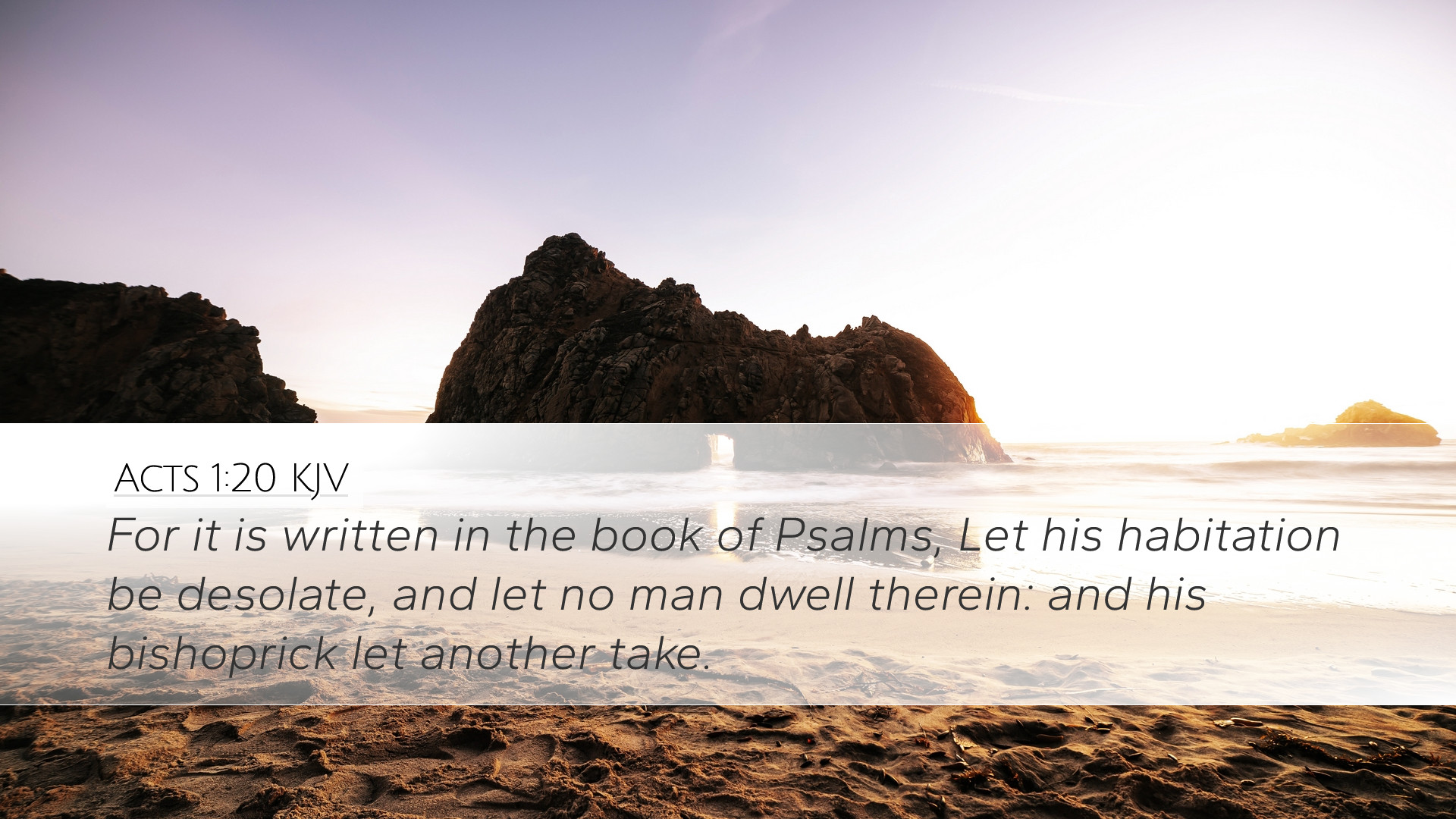Old Testament
Genesis Exodus Leviticus Numbers Deuteronomy Joshua Judges Ruth 1 Samuel 2 Samuel 1 Kings 2 Kings 1 Chronicles 2 Chronicles Ezra Nehemiah Esther Job Psalms Proverbs Ecclesiastes Song of Solomon Isaiah Jeremiah Lamentations Ezekiel Daniel Hosea Joel Amos Obadiah Jonah Micah Nahum Habakkuk Zephaniah Haggai Zechariah MalachiActs 1:20
Acts 1:20 KJV
For it is written in the book of Psalms, Let his habitation be desolate, and let no man dwell therein: and his bishoprick let another take.
Acts 1:20 Bible Commentary
Commentary on Acts 1:20
Acts 1:20 states, "For it is written in the book of Psalms, Let his habitation be desolate, and let no man dwell therein: and his bishoprick let another take." This verse occurs in the context of the early church’s decision to replace Judas Iscariot following his betrayal of Jesus. The commentary on this verse incorporates insights from historical texts and foundational teachings from various public domain commentaries.
Contextual Analysis
Before delving into the specifics of the verse, it is crucial to understand the broader narrative. The Acts of the Apostles begins with a crucial transitional moment in the early Christian community as they awaited the promise of the Holy Spirit. Judas's betrayal and subsequent death had left a notable void within the disciples’ circle.
Significance of the Quotation
- Scriptural Foundation: The reference to the book of Psalms suggests that the apostles turned to Scripture for guidance in addressing the apparent vacancy left by Judas. Psalm 69:25 and Psalm 109:8 are often identified as the sources for this quotation.
- Fulfillment of Prophecy: Both Barnes and Clarke emphasize that this moment is illustrative of the fulfillment of Old Testament prophecy. The necessity of fulfilling the Scriptures depicts God’s sovereign hand in orchestrating redemption history and the leadership of the early church.
Theological Insights
Matthew Henry emphasizes the providence of God in the selection of leadership. The act of replacing Judas underscores the theological principle that God maintains a faithful remnant even amidst human failure:
- The Nature of Apostolic Leadership: The mention of "his bishoprick" highlights the significance of apostolic authority. The term "bishoprick" reflects an office or role, reiterating that leadership within the church is divinely appointed.
- Human Agency and Divine Sovereignty: Clarke points out that while the apostles acted to appoint a new disciple, it was essential that they recognized that true authority rested with God. Their actions reflect both human responsibility and divine sovereignty.
Practical Applications
From an ecclesiastical perspective, the methodology employed by the apostles presents a model for church governance. In particular, this verse encourages contemporary pastors and church leaders to:
- Seek Scriptural Guidance: Just as the apostles referenced Scripture in their decision-making, modern church leaders should turn to the Bible for wisdom and direction in leadership appointments and all matters of doctrine.
- Recognize God’s Sovereignty: While taking proactive steps in leadership, an awareness of God’s overarching sovereignty should permeate all church decisions. God's purpose will ultimately prevail, even when leadership transitions appear tumultuous.
- Cultivate Accountability: The need for accountability in leadership, represented by the apostles' decision to fill the vacancy, underscores the importance of having checks and balances within church authority structures.
Conclusion
Acts 1:20 serves as a pivotal moment reflecting the church’s early commitment to adhere to God's Word while actively engaging in leadership transitions. The integration of quotes from the Psalms with the apostles’ decision illustrates the need for believers to remain rooted in the Scriptures as they navigate the challenges of faith and governance. This verse not only documents a historical event but also provides timeless lessons for pastors, theologians, and all believers involved in the life of the church.


